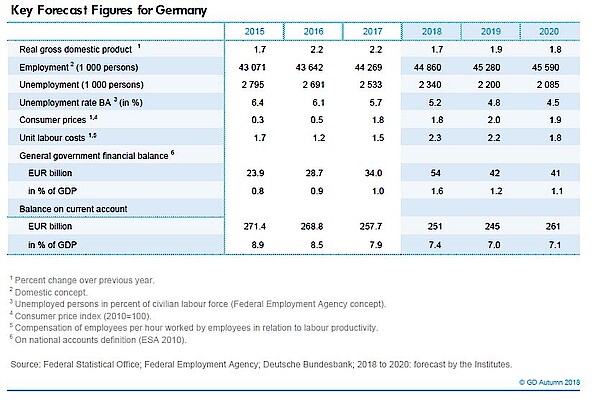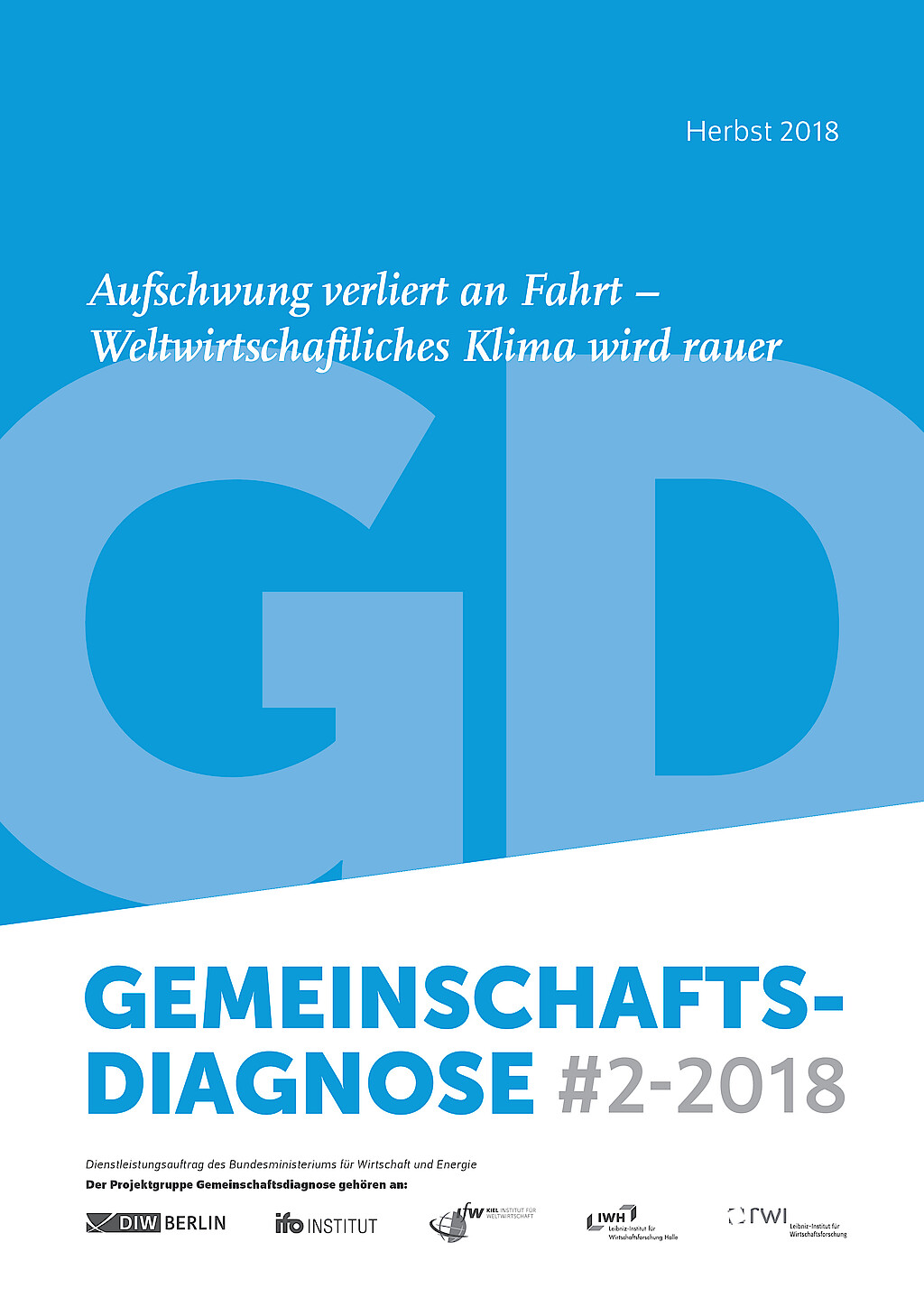Joint Economic Forecast Autumn 2018: Upturn Loses Momentum
“The upturn in the German economy is losing momentum. Demand from abroad has weakened, and companies are apparently suffering from labour shortages in production too,” explains Roland Döhrn, Head of Economic Forecasting at RWI – Leibniz Institute for Economic Research, which coordinated this autumn’s report. Commenting on the German government’s economic policy, he added: “Short-term initiatives like the family home-owner allowance tend to lead to windfall effects and rising costs because capacity utilisation in the construction industry is already high. In the current economic climate we need a housing policy that is geared more towards continuity.”

The number of persons in employment will rise from 44.9 million this year to 45.3 million next year and 45.6 million in 2020. At the same time, the number of registered unemployed persons will decline from 2.3 million this year to 2.2 million in 2019 and 2.1 million in 2020. This will bring the unemployment rate down from 5.2 percent this year to 4.8 percent in 2019 and 4.5 percent in 2020. Inflation in consumer prices will rise from an average of 1.8 percent this year to 2 percent in 2019, before dipping back down to 1.9 percent in 2020. Pressure from domestic prices will increase.
The institutes expect significant fiscal surpluses over the entire forecasting horizon. The surplus will hit a new record high of 54 billion euros this year. By 2020 the fiscal balance will melt down to 41 billion euros due to the government’s expansionary fiscal policy stance.
The risks for the German and international economic have grown since spring. At a global level this is mainly due to the rising number of trade conflicts, while the main risks at a European level are the possibility of Britain’s disorderly exit from the EU and the potential outbreak of a debt crisis in Italy.
The Joint Economic Forecast was prepared by RWI (Essen), DIW (Berlin), the ifo Institute (Munich), IfW (Kiel) and IWH (Halle).
Full-length version of the report
Joint Economic Forecast Project Group: Upturn Loses Momentum – World Economic Climate Grows Harsher, Autumn 2018. Essen 2018.
The full-length version of the report will be available at www.gemeinschaftsdiagnose.de/category/gutachten/
About the Joint Economic Forecast
The Joint Economic Forecast is published twice a year on behalf of the German Federal Ministry for Economic Affairs and Energy. The following institutes participated in the autumn report 2018:
- German Institute for Economic Research (DIW Berlin)
- ifo Institute - Leibniz Institute for Economic Research at the University of Munich in cooperation with the Swiss Institute for Business Cycle Research (KOF) at ETH Zurich
- Kiel Institute for the World Economy (IfW Kiel)
- Halle Institute for Economic Research (IWH) – Member of the Leibniz Association
- RWI – Leibniz Institute for Economic Research in cooperation with the Institute for Advanced Studies Vienna
Scientific Contacts
Dr. Claus Michelsen
German Institute for Economic Research (DIW Berlin)
Tel +49 30 89789 458
CMichelsen@diw.de
Professor Dr. Timo Wollmershäuser
ifo Institute – Leibniz Institute for Economic Research at the University of Munich
Tel +49 89 9224 1406
Wollmershaeuser@ifo.de
Professor Dr. Stefan Kooths
Kiel Institute for the World Economy (IfW Kiel)
Tel +49 341 8814 579 oder +49 30 2067 9664
Stefan.Kooths@ifw-kiel.de
Professor Dr. Oliver Holtemöller
Halle Institute for Economic Research (IWH) – Member of the Leibniz Association
Tel +49 345 7753 800
Oliver.Holtemoeller@iwh-halle.de
Professor Dr. Roland Döhrn
RWI – Leibniz Institute for Economic Research
Tel +49 201 8149 262
Roland.Doehrn@rwi-essen.de
Whom to contact
For Researchers

Vice President Department Head
If you have any further questions please contact me.
+49 345 7753-800 Request per E-MailFor Journalists

Internal and External Communications
If you have any further questions please contact me.
+49 345 7753-832 Request per E-MailIWH list of experts
The IWH list of experts provides an overview of IWH research topics and the researchers and scientists in these areas. The relevant experts for the topics listed there can be reached for questions as usual through the IWH Press Office.
Related Publications

Upturn Loses Momentum – World Economic Climate Grows Harsher: Joint Economic Forecast Autumn 2018
in: Externe Monographien, 2, 2018
Abstract
Der Aufschwung in Deutschland geht in sein sechstes Jahr. Er hat allerdings an Fahrt eingebüßt. Dies hat sowohl nachfrageseitige als auch angebotsseitige Gründe. Zum einen hat sich das Auslandsgeschäft im Einklang mit der Verlangsamung der Konjunktur in den wichtigsten deutschen Absatzmärkten abgeschwächt. Zum anderen sehen sich Unternehmen allem Anschein nach zunehmend produktionsseitigen Engpässen gegenüber, vor allem bei Arbeitskräften und beim Bezug von Vorleistungsgütern. Überlagert wird dies durch Probleme in der Automobilindustrie im Zusammenhang mit der Einführung des neuen Prüfverfahrens WLTP, die aufgrund der hohen gesamtwirtschaftlichen Bedeutung der Branche sichtbare Spuren beim Zuwachs des Bruttoinlandsprodukts hinterlassen. Die Umstellungsprobleme dürften aber im Winterhalbjahr überwunden werden. Hinzu kommen Impulse aufgrund von finanzpolitischen Maßnahmen, die zum Jahresbeginn 2019 in Kraft treten. Im Durchschnitt dürfte die Wirtschaftsleistung nach einem Zuwachs um 1,7 Prozent in diesem Jahr mit Raten von 1,9 Prozent im Jahr 2019 und 1,8 Prozent im Jahr 2020 expandieren. Die Beschäftigung dürfte weiter spürbar, wenngleich mit abnehmendem Tempo ausgeweitet werden. Die registrierte Arbeitslosigkeit nähert sich gegen Ende des Prognosezeitraums wohl der Marke von 2 Millionen. Die Inflation wird sich dabei voraussichtlich von 1,8 Prozent im Durchschnitt dieses Jahres auf 2,0 Prozent im kommenden Jahr beschleunigen und 2020 bei 1,9 Prozent liegen. Trotz einer expansiv ausgerichteten Finanz-politik zeichnen sich für den Staat weiterhin Haushaltsüberschüsse ab, die allerdings von 54 Milliarden Euro auf 41 Milliarden Euro zurückgehen werden.



